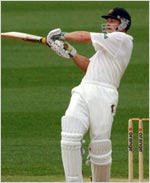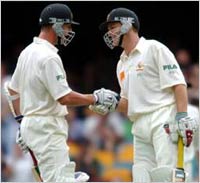Weather, Aussies prevail on day 2
Daniel Laidlaw
Rain has interfered with the first Test between Australia and New Zealand at
the Gabba when all but 29 overs of play were possible on day two.
After resuming at 6/294 following the loss of six wickets in the last
session of day one, Adam Gilchrist (88*) and Brett Lee (60*) returned
Australia to full control of the match with a record unbroken partnership of
133 for the eighth wicket. In total, Australia added a further 141 for the
loss of one wicket in between showers on the second day before no further
play was possible after tea.
 Rain is also forecast for day three, when Australia may bat just long for
Gilchrist to reach his fourth Test hundred before unleashing its pace attack
on New Zealand.
Rain is also forecast for day three, when Australia may bat just long for
Gilchrist to reach his fourth Test hundred before unleashing its pace attack
on New Zealand.
Having curtailed the middle order strength of Australia’s batting in
Ponting, Waugh, Waugh and Martyn for a combined total of 12, Gilchrist was
the sole remaining key wicket for New Zealand, as he and the tail had an
opportunity to add considerable runs after the upper order had again left
them some of the hard work.
Just one over was possible under Brisbane’s overcast skies before light rain
forced an interval of 56 minutes, which was to become a frustrating theme
for the day. Cairns struck in his first over after the resumption, having
Shane Warne caught at gully after a rare responsible innings of 22. The ball
was short outside off but not wide enough to cut, as Warne failed to get
over the shot in hitting it hard to Sinclair, giving New Zealand an early
wicket and becoming another batsman to fall to an attacking shot in leaving
Australia 7/302.
With a damp outfield wetting the ball and the bowlers’ footmarks a little
slippery from the rain, New Zealand did not have ideal bowling conditions
and Lee and Gilchrist were soon taking the game away from them. Dion Nash
bowled too short to Lee, allowing the swashbuckling No. 9 to free his arms
with several lusty cuts. The positive Lee did the bulk of the scoring
against both Cairns and Nash, while Gilchrist initially continued to leave
the ball responsibly and take toll only of the bad deliveries.
When New Zealand turned to its premiere strike bowler of the match to date –
Craig McMillan – Gilchrist began batting in more familiar style. Having
conceded just 13 from 7 overs on the first day, McMillan had 13 taken from
his first over on the second, as Gilchrist punished the part-time bowler
with cuts and drives. Cairns was also made to pay whenever he pitched too
full or too short as his bowling figures went past 100 runs conceded.
As it so often does, the positive play of Gilchrist and Australia’s lower
order, this time in the shape of Brett Lee, had the opposition floundering
under pressure and wondering how to stem the flow as the shape of the game
changed. By lunch, the eighth wicket partnership had realised a dangerously
burgeoning 59, with Gilchrist 44 and Lee 31. Australia were 7/361 after 14
overs had been bowled in the session.
On a worrying note for New Zealand, left-arm swing bowler Shayne O’Connor,
who had bowled prior to lunch, was reportedly taken to hospital for a
precautionary x-ray on his knee.
Another rain delay of 75 minutes after just 10 minutes after resuming had no
affect on Gilchrist, who was immediately in peak form, hooking Nash for two
consecutive fours. Even with two men back, testing powerful hooker Gilchrist
with bouncers was ill-advised, and he was only too happy to accept the
challenge.
With Vettori unable to grip the damp ball, which was constantly monitored by
the umpires and changed a couple of times, Cairns returned to the attack.
With conditions unfavourable and the batsmen in clear ascendancy, the
downcast New Zealanders were plundered, resulting in Astle and McMillan
being introduced in a return to the first day’s tactics. But restrictive
bowling ploys with the second line of attack would not work two days in a
row.
 Gilchrist’s strike rate accelerated exponentially after a watchful start the
previous evening and when he cut Astle for four, the eighth wicket
partnership with Lee broke the previous record of 93 for Australia against
New Zealand, set by Gary Gilmour and Kerry O’Keefe in Auckland back in 1976/
’77. The pair clearly enjoyed themselves.
Gilchrist’s strike rate accelerated exponentially after a watchful start the
previous evening and when he cut Astle for four, the eighth wicket
partnership with Lee broke the previous record of 93 for Australia against
New Zealand, set by Gary Gilmour and Kerry O’Keefe in Auckland back in 1976/
’77. The pair clearly enjoyed themselves.
Lee, who had lofted Cairns over mid off the previous over, cut New Zealand’s
leading bowler over backward point for six to raise the Australian 400 and
soon after hooked the same bowler for four to reach his second Test fifty.
If Lee could return to his potent bowling form, he might have the makings of
an all-rounder! The potential is there, as despite the aggressive shots it
was by no means a slogger’s innings, punctuated as it was by studied and
competent defensive strokes.
In full command and eyeing his fourth Test hundred, Gilchrist leapt down the
track to smash Astle over long on for six, before almost holing out to
mid-wicket when a top-edged pull off McMillan on 85 fell just short of a
diving Bell sprinting in from the deep.
At tea Australia were 7/435, with Gilchrist 88 and Lee 60, after adding 70
runs in 69 minutes of free-scoring strokeplay for the session, which was the
way the scores would stay.
If there was a question of the Black Caps quickly finishing off the Aussie
innings and retaining the momentum through the second day, it had completely
disappeared after Gilchrist and Lee’s entertaining display.
Scorecard: Australian 1st innings
More Columns
Mail Daniel Laidlaw